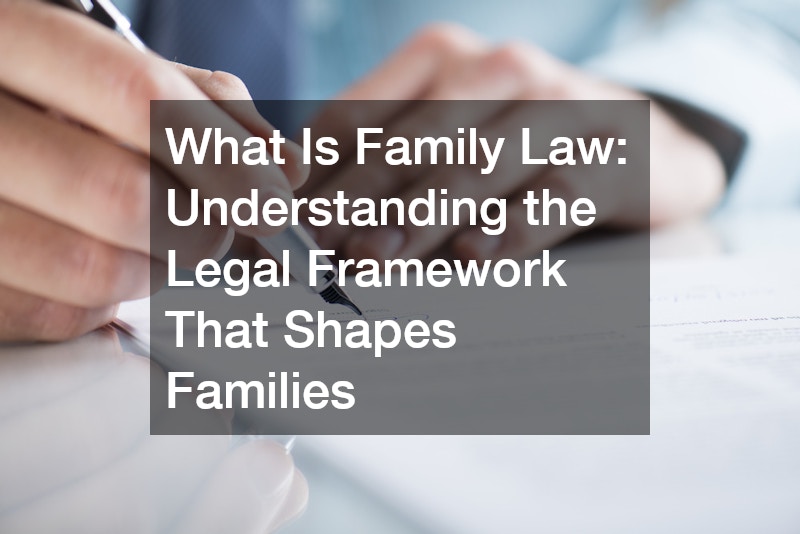
Family law is a vital area of the legal system that governs the rights, responsibilities, and relationships between family members. It plays a key role in resolving disputes, protecting individuals, and ensuring fair treatment when sensitive family matters arise. From marriage and divorce to child custody and adoption, family law provides a structured framework for handling situations that can significantly impact people’s lives.
The Purpose of Family Law
At its core, family law exists to provide legal guidance and structure for some of life’s most personal and emotional issues. These laws establish clear rules about how family-related conflicts should be resolved, ensuring that decisions are made fairly and in the best interests of those involved, particularly children.
By doing so, family law offers stability and predictability in what can otherwise be uncertain and stressful situations.
Marriage and Domestic Partnerships
One of the primary areas covered under family law is marriage. These laws regulate the process of entering into a legal union, including requirements such as age, consent, and licensing. Family law also addresses domestic partnerships and civil unions, providing legal recognition and rights to couples who may not be married but share a committed relationship. Through these legal structures, couples gain access to benefits such as shared property rights, decision-making authority in healthcare, and inheritance rights.
Divorce and Separation
When a marriage or partnership comes to an end, family law provides the framework for separation and divorce proceedings. Divorce laws govern how assets and debts are divided, how spousal support is determined, and how each party can move forward legally. The process often requires careful consideration of both financial and emotional factors, and family law seeks to balance these issues in a way that is equitable to both parties.
Child Custody and Visitation
One of the most sensitive aspects of family law is child custody. When parents separate, decisions must be made regarding where the child will live and how much time they will spend with each parent. Family law courts typically focus on the child’s best interests, prioritizing stability, safety, and a nurturing environment. Custody arrangements may be joint, where both parents share responsibilities, or sole, where one parent takes primary responsibility. Visitation rights are also established, ensuring that children maintain a relationship with both parents whenever possible.
Child Support and Parental Responsibilities
Closely connected to custody is the matter of child support. Family law ensures that both parents contribute to their child’s upbringing, regardless of whether they live together. Support payments are calculated based on various factors such as income and the child’s needs. The goal is to provide financial stability for the child, covering essentials like housing, education, and healthcare. Family law also establishes broader parental responsibilities, ensuring that children receive care, guidance, and protection from both parents.
Adoption and Guardianship
Family law also governs adoption, a process that creates a legal parent-child relationship between individuals who are not biologically related. Adoption laws are designed to safeguard the child’s welfare while respecting the rights of biological parents. Similarly, guardianship laws allow individuals to assume responsibility for minors or dependent adults when biological parents are unable to care for them. These legal arrangements ensure that vulnerable individuals are protected and cared for within a supportive environment.
Protection From Domestic Violence
Another critical aspect of family law involves safeguarding individuals from domestic violence and abuse. Courts can issue protective orders to keep victims safe, restrict contact with abusers, and provide immediate relief during dangerous situations. Family law prioritizes the safety and well-being of vulnerable family members, reinforcing its role as a protective framework in society.
Paternity and Parental Rights
Establishing legal parenthood, or paternity, is another important part of family law. Determining paternity can affect custody rights, child support obligations, and inheritance. These laws ensure that both parents are recognized and held accountable for their responsibilities, while also giving children access to their full legal rights.
Alternative Dispute Resolution in Family Law
Not all family disputes end up in court. Mediation and collaborative law are alternative dispute resolution methods commonly used in family law cases. These approaches encourage cooperation and communication, allowing families to reach agreements without the stress of lengthy litigation. By focusing on solutions rather than conflict, mediation often results in more positive outcomes for everyone involved.
The Evolving Nature of Family Law
Family law continues to evolve as society changes. Shifts in cultural norms, advances in reproductive technology, and the recognition of diverse family structures all influence how laws are applied and interpreted. This dynamic nature ensures that family law remains relevant and responsive to modern challenges, adapting to meet the needs of today’s families.
Family law is more than just a set of rules; it is a framework that shapes some of the most significant aspects of people’s lives. It provides structure in times of uncertainty, ensures fairness in disputes, and protects the rights and welfare of both adults and children. Whether addressing marriage, divorce, child custody, or adoption, family law plays an essential role in safeguarding families and guiding them through challenging transitions. By offering stability and clarity, it helps individuals navigate some of life’s most complex and emotional situations with dignity and fairness.




